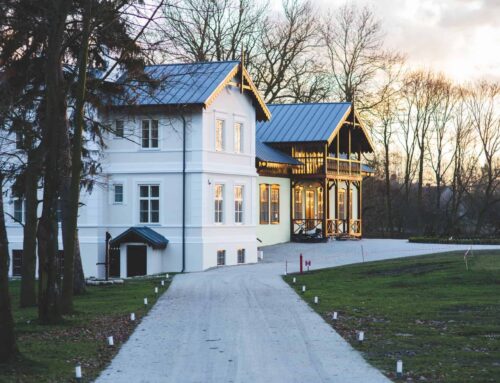In a densely populated city like San Francisco, where the land area is limited but the demand for housing is high, condominiums offer a great alternative to fulfilling a city life. From a modest studio to an overlooking penthouse in the sky, interested condo buyers have plenty of options to grant their heart’s desires! So whether it be for your permanent residency or long-term rental occupancy, condominiums are a great entry point to the real estate market and a lucrative investment opportunity.
The Nature of a Condominium
A condominium, or condo, is a building complex composed of privately owned individual units. Its size ranges from 2-4 condo units to over 200 units offering different amenities. With a condominium property, your ownership is defined by a certificate of title, where owners own the interior of their condo from the walls in. Legally, you are buying only the subdivided space within a complex, not including the ground to which the building is connected. Unlike in single-family homes, owners acquire both the structure and the land. In terms of financing, a condo ‘unit’ can be bought, sold, financed, and inherited through a will or trust.
Furthermore, each condo owner shares joint ownership in common areas such as pools, elevators, hallways, and other exterior areas beyond their personal space. Although condo owners have monthly dues for building maintenance, they may be assessed with special fees in case a significant repair is needed.
The Homeowners Association (HOA)
When you buy a condominium, you are not only acquiring a unit in a building. Instead, you also agree to its governing policies known as CC&Rs (Covenants, Codes, and Restrictions) enforced by the Homeowners Association. The HOA is an organization formed within the community to supervise and maintain a planned unit development, such as a condo. Interested condominium buyers must always remember that the CC&R is a legally recognized document filed to the county recorder’s office. Any violation or non-compliance will be penalized accordingly. So, even if you disagree with the policy and still choose to acquire the property, you have to obey the existing regulations.
On the bright side, the good thing with HOA is that they will keep the building and the community clean and well-maintained. A good and pleasing environment is always good to start the day! With HOA, you won’t have to worry about sanitation in the common area, garbage waste disposal, property management, and other housekeeping duties! All you have to do is maintain your personal space, and they will do the rest. Coming home is as easy as 1,2,3!
The Governing Documents
As with every other property, several documents are involved when acquiring a condominium. The single, most important document is the CC&Rs, a set of lawyer-drafted documents stipulating the essential aspects of the property and development. Some of the contents included are as follows:
- Limitations and allowable actions for unit remodeling and repairs
- The ability to lease a unit/short-term rental (at least 30 days or longer)
- Pet policies (pet limit, weight limit, breed prohibitions)
- How HOA money is raised, spent, and managed (dues and assessments)
- Contingency plans if the building/development is destroyed
Since the CC&R is already in place, there is almost zero chance to alter the policies unless the majority of the condo owners recommend an amendment. That is why as an interested buyer, you must first check the CC&Rs of the building. No matter how much you love the property and the amenities, if the policies are too stifling, you will not enjoy your unit and community to the fullest!
The Corresponding Monthly Fees
Condominiums vary in size and amenities, which greatly influence your monthly dues. The bigger the building, the better the amenities, the higher the fees. Below are some of the estimated monthly payments from different types of buildings.
- A simple 1-2 unit building will incur monthly dues of $100
- A 2-4 unit building is estimated to incur monthly dues of $200-$600+
- A medium to large building with elevators will incur monthly dues of $500-$700
- A large building with lobby attendants, services, and common areas such as lounges, party rooms, and parking is estimated to incur monthly dues of $800-$1400
- A luxury experience will incur monthly dues of $2000+
Needless to say, the more amenities and services there are in your complex, the higher the corresponding fees will be. All payments collected will be used to cover building insurance and maintenance, renovations, equipment and amenities repairs or upgrades, and other widely used common areas. For transparency purposes, all HOA maintains open communication among condo owners regarding expense breakdown and future developments.
The Condo Financing Options
Aside from being a great alternative to achieving city living in San Francisco, acquiring a condominium through financing is flexible and accessible. Interested condo buyers can avail of conventional loans, FHA loans, or VA loans. A conventional loan is the most common type of loan that can either be a traditional fixed-rate or adjustable-rate mortgage with specific monthly payments and term periods. On the other hand, an FHA loan, or Federal Housing Authority loan, is a federally backed loan with a lesser demand for credit requirements and down payments. However, FHA condo regulations are more compared to single-family homes. Finally, a VA or Veterans Administration loan is a special loan reserved for military members, veterans, and eligible surviving spouses.
Although condo buyers will not experience the headache of where to avail financing, the major setback they will encounter is mortgage rate and downpayment. Condominium properties usually come with a slightly higher interest rate and are required to comply with additional paperwork. Interest rates are estimated to be higher by 0.125 percent to 0.25 percent. Down payments for a condo unit are also relatively higher.
The Building Assessment
All this time, we have only considered the external factors you should know before buying a condominium. But make no mistake. It is equally important to learn the whereabouts of your chosen building. When you set your eyes on a building and community that captures your heart, pause. You cannot make a purchase based on emotions. You have to do your due diligence and check not only the HOA or the CC&Rs but also the history of the building, owner occupancy ratio, and more. Some of the frequent points to ponder are as follows:
- Condo Financing Eligibility. Unless the mode of payment is spot cash, financing is the most vital step to securing a property. So whether the building is eligible for a particular financing option, you should be aware from the beginning to save time and unnecessary stress. You can check with the U.S. Department of Housing and Development (HUD) for the list of requirements for condo financing eligibility.
- Owner-to-renter ratio. Another essential factor in securing financing is the owner occupancy ratio. A building with a higher number of renter-occupied units may be a riskier investment, especially since a condo is still subject to eviction control laws. Additionally, if you’re hoping for an FHA loan under this circumstance, there is a low chance for your loan to be granted. An FHA loan requires at least 50% of all units within a property to be owner-occupied.
- Previous/Ongoing litigation. If you see a building that fits exactly what you are looking for but is currently in litigation, RUN! Most lenders will not loan on a building in litigation! And even if you are lucky enough to find one, they usually charge a higher rate.
- Upcoming developments and projects. Are there any special assessments coming up in the future? All major developments and projects within the community usually require more money than an HOA has in its reserves. When this happens, condo owners will split the extra costs between them. If you are uncomfortable with this setup, it is best to ask around and be informed about the property you are interested in buying.
The Price Range of Condominium
San Francisco’s real estate market is still recovering from the impact of the pandemic. According to Norada Real Estate Investments, the current unsold inventory index for condominiums is 5.4 months. As a result, current median prices are lower by 2.5% vs. last year. As of December 2022, condominiums’ median price range is $1,170,000. This is actually a good opportunity for people who have been wanting to buy a condo but were previously priced out!
So if you are curious about the best time to buy a condominium, NOW is the best time to get one! The market has made it favorable for condo buyers. And if you want to gain more insights about condominiums in San Francisco or if you are interested in buying a unit, feel free to contact us. We are more than happy to assist you.




